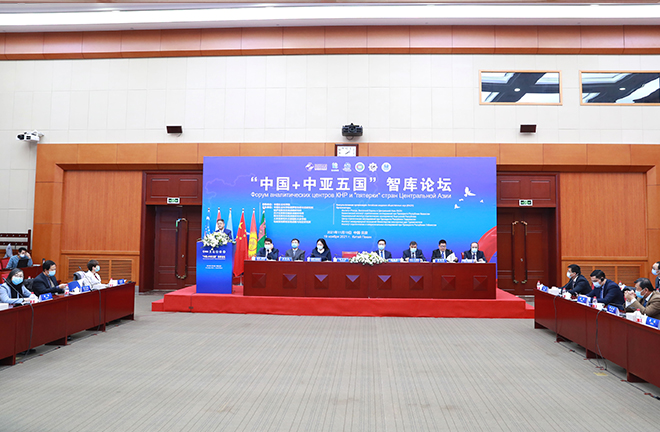Think tank forum explores Afghan situation

The First Think Tank Forum of “China+Central Asia” (C+C5), in Beijing on Nov. 19, sheds light on Afghanistan’s new situation and Central Asian security and development. Photo: Zhu Gaolei/CSST
The First Think Tank Forum of “China+Central Asia” (C+C5) was convened in Beijing both online and offline on Nov. 19, under the theme “Afghanistan’s New Situation and Central Asian Security and Development.”
State Councilor and Foreign Minister Wang Yi sent a congratulatory letter to the forum. Vice Foreign Minister Le Yucheng attended the opening ceremony of the forum, read Wang Yi’s congratulatory letter and delivered a speech.
C+C5
In his speech, Le Yucheng said that the congratulatory letter from Minister Wang Yi expounded on the significance of the forum, and clarified the development direction of the relations between China and Central Asian countries, which provides important guidance for future think tank exchanges between the two sides, according to China’s Ministry of Foreign Affairs.
Gao Peiyong, vice president of the Chinese Academy of Social Sciences (CASS), pointed out that the establishment of the Think Tank Forum of “China+Central Asia” is an important measure in promoting think tank exchanges under the framework of the C+C5 foreign ministers’ meeting mechanism. It is aimed at facilitating policy communication and exchanges as well as mutual learning between China and Central Asian countries, providing intellectual support for countries in the region to deepen cooperation in various fields.
The situation in Afghanistan is closely related to regional security and stability, Le Yucheng said. China and Central Asian countries share a high degree of common concern on the Afghan issue, Le Yucheng continued.
China is ready to work with its Central Asian partners to deepen regional law enforcement and security cooperation, jointly build a united front against terrorism, and help Afghanistan maintain stability, improve people’s livelihood, and integrate the country into regional cooperation schemes, so as to turn the region into a common zone of stability and an island of security, Le Yucheng said.
Gao suggested that China and Central Asian countries should actively assist Afghanistan in response to the humanitarian crisis, and promote the smooth transition of the situation in Afghanistan. He also suggested propelling the formation of a joint force of various multilateral mechanisms related to Afghanistan, including the Shanghai Cooperation Organization (SCO), to create sound external circumstances for Afghanistan’s peaceful reconstruction and sustainable development.
SCO Secretary-General Vladimir Norov said that Central Asia is the core area of the SCO. Security and stability are important issues in this field, and Afghanistan is the key to this issue. At present, it is necessary to fully tap and use Afghanistan’s existing potential. It is also vital to use the existing international mechanisms, such as the SCO and the Collective Security Treaty Organization, to rebuild a dialogue platform and resolve the humanitarian crisis in Afghanistan, so as to enable Afghanistan to achieve lasting development and peace as soon as possible.
Way forward
The positive change brought by the transformation in Afghanistan to the Central Asian region is the possibility of establishing a new cooperative regional order, said Sun Zhuangzhi, director of the Institute of Russian, Eastern European, and Central Asian Studies at CASS.
The cooperation basis of the SCO is the mutual political and security trust among the member states and economic trade reciprocity. In the future, extensive regional cooperation can be implemented within the SCO’s framework.
Xu Bu, president of the China Institute of International Studies, said that the establishment and operation of the C+C5 mechanism has provided a new and more effective platform for all parties to strengthen cooperation on the Afghanistan issue.
Zarema Shaukenova, director of the Kazakhstan Institute of Strategic Studies under the President of the Republic of Kazakhstan, said that Afghanistan is facing a comprehensive economic crisis. In their next step, the Afghan regime may move toward a high degree of centralization and monopoly, and may also form a new military force. The situation in Afghanistan will become more complex, full of uncertainties and unpredictability.
In order to ensure peace and stability in Central Asia and help combat international terrorism and the drug trade, a dialogue mechanism with the new Afghan government should be quickly established to carry out constructive dialogue, suggested Rustam Asizbaev, director of the National Institute for Strategic Studies of the Kyrgyz Republic.
Khurshed Ziyoi, director of the Center for Strategic Studies under the President of Tajikistan, believes that due to geopolitical, security, and economic considerations, “we all need to continue to strengthen cooperation with Afghanistan under the framework of the SCO.”
J. Gurbangeldyev, dean of the School of International Relations of the Ministry of Foreign Affairs in Turkmenistan, noted that the international community supports Afghanistan’s peaceful reconstruction being carried out under the leadership of the United Nations.
Economic integration is an important guarantee for the restoration of normal social life in Afghanistan, said Eldor Aripov, director of the Institute for Strategic and Interregional Studies under the President of the Republic of Uzbekistan. “We need to build a new, mutually beneficial, regional economic cooperation model to promote the stable and sustainable development of Afghanistan and the region.”
Edited by JIANG HONG
